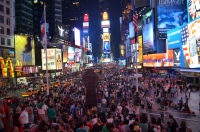
Times Square is a hub for tourism, but harassment from the once-cuddly characters can ruin the experience. (Courtesy of Flickr).
By Benedict Carrizzo
I remember seeing the bright lights, B-list celebrities, overpriced restaurants and obnoxious tourists walking around Times Square when I was very young. Before the Naked Cowboy and other eccentric characters arrived, there were the classic superheroes we knew and loved—Batman, Superman, Spiderman, Wonder Woman—and I would enthusiastically tug at my mother’s arm to get a picture with them. They were a staple of my childhood.
I was a huge Batman fan. I loved to see him in Times Square (in a costume that could more appropriately be called Batman’s pajamas, but it was cool nevertheless). He would wander around the public square, take pictures with the kids and, sometimes, earn a generous tip from enthusiastic parents. He is, to me, one of the reasons why Times Square was special. It was not just a “tourist trap,” despite the overpriced food and drinks and “I love NY” shirts sold on the street. The costumed characters were good people, happy to make others happy.
To my dismay, however, the cuddly characters of yesterday have become the aggressive agitators of today, pressuring tourists to hand over their money to them.
What is happening, to the consternation of many characters and tourists, is that some superheroes are harassing and groping tourists. They are also intimidating tourists into giving large tips. The latter issue is not surprising, considering how difficult it is to earn a living as a costumed character. In economically challenging times, it seems natural for panhandlers to get more aggressive since they need more money to survive. Thankfully, this is only the case with a few bad apples. The Naked Cowboy, for example, understands the problem and has expressed solidarity with efforts by the city council to fix the issue.
The city council recently passed a bill for the Transportation Department to designate the costumed characters to specific areas in Times Square, lessening the likelihood of assault. Some costumed characters are disappointed with the solution, viewing it as an infringement on their rights to free speech and a threat to their livelihoods. Others see these consequences as a mere nuisance rather than a true threat.
The Transportation Department is also commissioned to divide Times Square into “special commercial zones” to use for approved concessions and events. These zones may specifically be created for cultural and educational activity. This is not limited to Times Square, since more than 60 public spaces will become “pedestrian plazas.” Each of them will be unique and house their own set of rules. The bill will better solidify the plazas in the city, making them official public spaces, similar to parks and beaches. Local businesses will also be encouraged to work with smaller plazas to provide programming and activities, strengthening the relationship between businesses and the community.
This will make Times Square safer for the tourists who yearn for an overpriced dinner and a family photo with Elmo. Tourists will be less miserly and more willing to give tips to someone in a designated space. And the costumed characters can be better managed, which will prevent crimes. If the characters’ behavior is fixed, reputations will improve and they will receive more tips (out of goodwill, not intimidation). If the superheroes gain a reputation as nonchalant and friendly, rather than aggressive and mean, more tourists will be willing to approach and tip them, ultimately improving the condition of Times Square and making it a safer and friendlier place for visitors to pass through. Times Square is known as a quirky place filled with eccentric characters, wacky-themed restaurants and over-the-top street performers. Watching it deviate from this reputation because of a few bad actors would be depressing, and it would hurt the costumed characters more than anyone else.
This decision will improve Times Square and the city as a whole. Making “public plazas” will foster community development, business interaction and, of course, alleviate the contentious issue of costumed-character harassment.
Benedict Carrizzo, FCRH ’18, is a communication and media studies and English double major from Long Island, New York.

